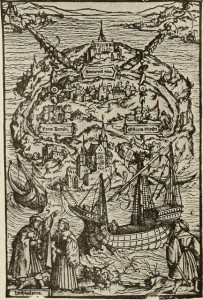Course Overview
Our point of departure
How do you imagine what you consider a *better* place? Is it where everyone lives together in harmony? What does this society look like and how does it operate? How do you know your vision for a better world will succeed?
The crux of this course
The problem of social utopias is in realizing them. Born of rational thought and subject to romantic design, utopian communities continue to inspire grand plans. This semester, we will read, discuss, and write about how some of the greatest utopian thinkers, Plato, Rousseau, More, and other revolutionaries, have confronted the knotty problems of social utopia with creativity, sound judgment, and passion. How philosophers, political theorists, leaders of social movements, and community activists imagine utopia reveals a great deal about the actual societies in which they lived.
Not just abstract ideas, but also political, economic and social conditions spur utopian experiments, both real and imagined. Through research and on-site visits to “intentional communities” we will see how utopian ideals of equality, harmony and happiness are translated into the structures of every day life. It is at this crossroads where utopian societies must confront the problem of individual will in conflict with the dictates of the common good. In light of these limitations, how could anyone establish a social utopia out of an imperfect world?

